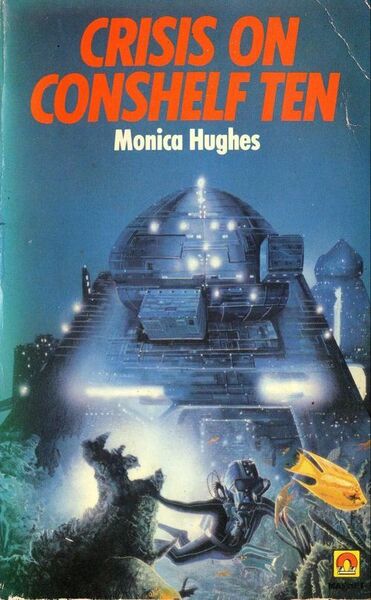Cycle Incomplete
Crisis on Conshelf Ten (Conshelf Ten, volume 1)
By Monica Hughes

1 Dec, 2024
Monica Hughes’ 1975 Crisis on Conshelf Ten is the first volume in her Conshelf near-future young-adult science fiction Conshelf Ten duology.
Kepler Masterman, son of Moon Governor Masterman, accompanies his father to Earth. Kepler’s father intends to plead the Moon’s case for national recognition. Kepler being fifteen, he is classified as a “non-productive unit” and not permitted residence on the Moon without a parent1.
There’s just one minor problem with Earth from Kepler’s perspective, one that makes all of its wonders irrelevant to the young non-productive unit.
Born and raised on the Moon, Kepler is a noodle-armed weakling who cannot easily move under his own power on the Earth. Simple existence is a misery for Kepler. Perhaps with time he could adjust. Perhaps with time he would perish. Happily, that’s a test he can evade.
Kepler’s Aunt Janet and Uncle Ted live and work in the undersea facility Conshelf Ten. While the gravity within the submerged habitat is as onerous as it is on land, Kepler would enjoy neutral buoyancy while swimming. Thus, he could be comfortable at least some of the time, and the swimming could help him build up muscle mass.
To sweeten the deal, Kepler discovers that a loudly eccentric teen hottie he met on land, Hilary, hails from Conshelf Ten. While Kepler is already engaged to be married2 and Hilary is already dating Kepler’s cousin Jon, nothing says Kepler can’t look at Hilary or chastely enjoy her company.
Like the Lunar settlements, Conshelf Ten exists in a hostile environment. Like the Lunar settlements, Conshelf Ten is owned and operated by corporations who prioritize profit over the well-being and happiness of their employees. Conshelfers have died because of such corporate callousness.
Like the Lunar settlements, Conshelf Ten contains activists bent on freeing the undersea communities from their land-based masters. However, the sea dwellers appear to have an option open to them that Lunarians lack. Kepler’s brief glimpses of gilled humans suggest that humans can be adapted to live in the oceans.
Kepler knows too much. The extremists, of whom Hilary is one, don’t want to kill Kepler. They will, however, cheerfully frame him for dire crimes.
~oOo~
I myself would not name a sympathetic protagonist “Masterman” but that’s just me.
Sometimes, physical circumstances shape custom. Canada only has about four people per square kilometre. Finding partners can be challenging. Thus, the legality of cousin marriage in Canada, as the only potential spouses within foraging range might well be relatives. In fact, “can cousins marry” was at one time the most frequently asked question for the relevant authorities.
Marriage on the Moon is likewise constrained by circumstance and in this case, parental disregard for children’s autonomy. Kids are promised to each other at thirteen and married at eighteen, just as they enter the Lunar workforce.
I couldn’t tell if the kids get to choose their spouses or if the parents do that for them. The justification, that this system avoids conflict, inclines me to suspect the second. Either way, I am sure that this is a social custom that will have no horrifying consequences, any more than Canada is inconvenienced by all those sixteen fingered, three eyed babies geckoing their way up.
As regulars may remember from a previous review of a Hughes novel, Hughes has a somewhat ambivalent view of political activism. On the one hand, injustice exists and is bad. On the other hand, upending the political system, particularly through dramatic means, could have consequences that are worse. At the very least, it requires uncomfortable conversations. Revolution might end in the Conshelf’s annihilation; thus, Kepler argues in favor of negotiated reforms. Nobody in power is willing to listen, thus Hilary favors revolution by force.
Kepler is being just a smidge hypocritical3, as he is in possession of information nobody else on Earth save for his father shares. Yes, the Lunarians are negotiating for statehood. They do have a contingency plan if that fails, one based on violent revolution. If the Conshelf Ten people launch their plan before Lunar negotiations finish, that could accidentally kneecap Lunar nationhood.
To his credit, while Kepler is more motivated by national self-interest than he admits, he is willing to embrace personal risk to assist the Conshelfers make their case in a way that does not impede Lunarian ambitions.
As was the custom in those days, Crisis is very short, 143 pages in most editions. Consequently, there’s no room to really develop the characters. On the plus side, the plot is zippy fast. It has to be.
Crisis on Conshelf Ten is long out of print.
1: Disney should take note. Kepler’s mother is dead, which makes this perfect fodder for a Disney movie.
2: Trust me, I will get to that detail.
3: Hilary is also just a little hypocritical, in that she is a keen booster of mermanification without being willing to undergo the procedure herself.
